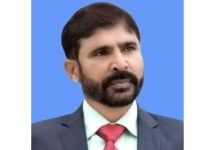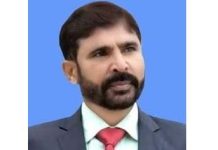By: Qamar Bashir
There is never a dull moment in Pakistan across any sphere of life. A lot is happening concerning the three pillars of the state. The establishment had dominated all three pillars until one decided to rebel, albeit to some extent, when six judges of the high court penned an SOS message to the Supreme Judicial Council, highlighting the pressure they faced in dispensing justice, particularly in politically consequential cases. Later, during a hearing by the Supreme Court in suo moto cases, the entire judiciary, from top to bottom, joined the outcry, sending chills down the spine of the entire nation and a message to the establishment to ease off, at least for the time being, concerning the judiciary.
However, the establishment’s stakes are too high, because the subdued and dominated judiciary was their primary tool to deal with non-compliant political elements. Without the judiciary on their side, they may feel handicapped in achieving their set objectives.
To push back defiant judges and regain control, a systematic campaign of character assassination, now familiar to us, was launched in both traditional and social media platforms. Detailed information about the assets of non-compliant judges and their families, travel histories, active visas, US residency status, and other sensitive details were obtained from official channels and injected into social media with a negative spin.
Vloggers were enlisted to hurl abuses, allegations, and insults at the six judges. A frontman filed a reference against Justice Kayani in the Supreme Judicial Council (SJC), alleging that Justice Kayani “waged a war against the forces of Pakistan in a planned manner by influencing and persuading other high court judges.”
The judges retaliated, noting that state institutions leaked confidential data, and specific X (formerly Twitter) accounts and hashtags were employed in conducting a smear campaign. They asserted that such actions would face consequences through contempt of court proceedings, which could even implicate “high office.”
True to their words, upon separate requests from Justice Mohsin Akhtar Kayani and Justice Babar Sattar, Chief Justice of the Islamabad High Court (IHC), Justice Aamer Farooq, constituted two separate larger benches to hear the complaints of the senior puisne judges. A three-member bench, comprising CJ Farooq, Justice Miangul Hassan Aurangzeb, and Justice Arbab Mohammad Tahir, was formed to hear Justice Kayani’s complaint, while another larger bench, consisting of Justice Kayani and Justice Tariq Mehmood Jahangiri, was established to address Justice Sattar’s complaint.
However, the matter did not conclude there. Justice Babar Sattar, presumed to be one of the motivators for the six rebel judges, lodged a written complaint on May 14, 2024, with the Chief Justice of the Islamabad High Court. He stated that he received an intimidating message from the head of an intelligence agency, urging him to back off from extensive scrutiny of the existence and mode of surveillance by the intelligence agencies in the case filed by PTI founder’s wife, Bushra Bibi, and Najam Saqib, son of former Chief Justice of Pakistan (CJP) Saqib Nisar, last year regarding audio leaks.
In the impugn case, the court had issued notices to the heads of intelligence and investigation agencies, including ISI, IB, and FIA, as well as relevant ministries, PTA, and PEMRA, to address the question of whether there exists a legal framework allowing surveillance of citizens.
Soon after Justice Babar Sattar’s letter was made public, the intelligence agencies promptly sought assistance from the Attorney General of Pakistan, who refuted Justice Babar’s claim of receiving a “back off” message, but realizing that their typical tactic had backfired.
In addition to the judiciary, which is struggling to regain its independence, albeit with some success, the establishment has retained many other weapons, including kinetic ones, in its arsenal to reassert control over the judiciary. However, it currently faces a challenging situation.
The establishment is facing a two-pronged strong defiance from the political front as well. Despite enduring punishing reprisals from the establishment, the PTI does not appear intimidated, scared, or compromising anymore. The party’s founder chairman and leaders have been displaying signs of almost total defiance. They reacted equally aggressively to the assertive press conference by the DG-ISPR. Instead of seeking forgiveness from the establishment, they are demanding that the establishment seek forgiveness from them.
Furthermore, the establishment is also facing blatant attacks from Maulana Fazal ur Rehman, who charges the army for actively participating in politics and threatens that as long as the army remains involved in politics, it would be treated as a politician and must face the consequences of being a politician.
The establishment faces another significant threat: its public image, which is deteriorating with each passing day. However, the Public Relations Wing, instead of utilizing public relations tools and strategic media management techniques, heavily relies on the coercive use of power, such as slowing down the internet and suspending social media platform services. Additionally, it leverages traditional media instead of addressing the core issues that are generating negative publicity and adversely affecting the image of the armed forces.
Despite these threats, the establishment possesses numerous strengths. It exercises total and unquestionable control over the two pillars of the state: the parliament and the government. The parliament is largely composed of members who owe their positions to the establishment’s patronage, without which they would have had little chance of being elected. Similarly, the government is formed by parliamentarians initially selected by the establishment.
As long as these two pillars remain subjugated, the establishment will persist in achieving its objectives across all sectors, including legislation, politics, justice, economy, finance, and business.
By: Qamar Bashir
Former Press Secretary to the President
Former Press Minister to the Embassy of Pakistan to France
Former MD, SRBC

















